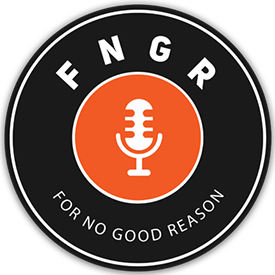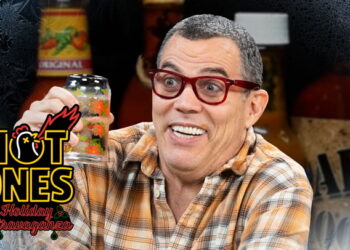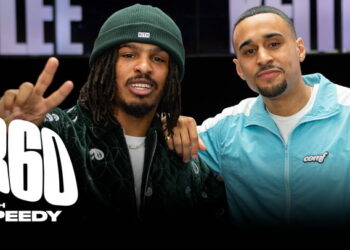“It’s kind of amazing to me still that Prisoners of the Ghostland even got made,” Nicolas Cage, star of Prisoners of the Ghostland said at the end of our conversation. “It almost didn’t.” He went on to explain how Prisoners director Sion Sono’s dream of making his English-language debut and first time making a film overseas was almost dashed away after he suffered a heart attack. Cage shared that this “experience compelled me to ask him to make a movie in Japan, because I didn’t want anything to happen to him. He’s not only a great filmmaker, he’s also my friend.”
I didn’t know what I’d be getting into when I first watched Prisoners of the Ghostland. Cage has been acting since 1981, and as he said during our conversation, “I’m trying to give you something unique, because I have to stay interested.” That’d explain him choosing projects like the rose-hued horror Mandy (2018) and another critical darling, 2021’s Pig, which many liken to John Wick. Even still, Cage’s unnamed protagonist in Prisoners is dealing with the horrific crime that got him locked up while trying to work himself through this situation, where he’s sent on a suicide mission to rescue a woman from a dystopian wasteland. This Hero (which is how he’s referred to) has to do all of this within a manner of a few days, while wearing a suit that’s fitted with explosives in vital areas of the anatomy. Sundance Festival Director Tabitha Jackson praised the film’s “imagination” and “energy.” The film, which is out now in theaters and available on-demand, is described by Cage as the “wildest” movie he’s ever made, and for good reason. It’s a film that has to be seen to be believed, and on the low, should be appreciated for the boundaries it pushes against in order to realize a vision.
For those of you who dare take a trip to the Ghostland this weekend, we recommend coming back to this conversation, which has Cage not only speaking highly of Sono (who he lovingly refers to as “Sono-san”) and how they executed the vision for this film, but he gives some insight on his approach to filmmaking in general. Some of his projects might seem gonzo, but you have to appreciate those who willingly buck the trend. Cage’s on his own journey and leaving an interesting trail of projects behind him. When it’s all said and done, Prisoners of the Ghostland might be the one that has come closest (so far) to realizing his vision of cinema.
I’ve been hearing about this film a lot. Before Sundance, I spoke with Tabitha Jackson, who talked about the imagination and the energy within Prisoners of the Ghostland. I also read that you called this film your wildest film yet. In following your career, you’ve made a lot of wild films—that’s a huge statement. Did Prisoners come closest to checking all of the boxes for you when it comes to what you want out of a film?
I think it’s a bit of a watershed moment in that regard, because in contrast to Pig, I was working with—I call him Archangel Michael [Sarnoski, who co-wrote and directed 2021’s Pig], who kind of rediscovered me. I knew it would take a young filmmaker with a vision to know how they could utilize me, so I’m very thankful for that. But then again, that was a more quiet, meditative kind of, I call it “haiku” approach to performance. Whereas Prisoners allowed me with Sono-san and his wonderful, unique, magical vision to explore what I like to call my more “Western kabuki” style of performance, which is a more… And it’s all by design. It’s all thought-out and drawn out, and my voice is my instrument. My body is my instrument. What kind of moves can I make? How can I almost get operatic with the word “testicle,” for example.
It was refreshing to get back into exploring where I’d been kind of trying to go with the limits of film performance in terms of getting outside the box, going more opera, as opposed to the photorealistic natural style. But I’m glad I have both because they complement one another because, especially in such close proximity, I’m trying to give you something unique, because I have to stay interested. You know, since I was 15, I’ve been doing this for 43 years, and if I’m not interested, you’re not going to be interested. So I have to find things that galvanize me. And this is what happened with Prisoners.
I watched the film twice and that “testicle” line read, in particular, made me laugh during both viewings. How do you approach a line read like that? What was the motivation?
I think all men can understand the nightmare that would be losing a testicle, and I like words. I thought that that is a funny word, and so I could really hit it out of the ballpark, pun intended. We can all feel some pain with that, us men with the balls, so I thought I could have some fun with that line.
Sono-san knew what a fan I was of Charles Bronson’s performance in Once Upon A Time in the West, and I was just trying to—I don’t look anything like Charles Bronson, but I was trying to embrace my inner Charles Bronson. So that immediately kind of created a ripple effect of the spaghetti Western, if you will, going into the movie. And so it was kind of like a samurai spaghetti Western
Was that sequence one of the more difficult ones to pull off on camera?
I was blessed to work with a great group of people and Tak [Sakaguchi, who plays Yasujiro] is as good as it gets. He really knew what he was doing in terms of the amount of time we had and what we could or couldn’t achieve with the wherewithal we had and the time we had, so yes and no, to answer your question. I was in really good hands with Tak and he managed to make it work, but I was a little bit concerned that we wouldn’t get it all, but we did. And that’s literally because of him.
Prisoners of the Ghostland is showing in theaters and streaming on-demand now.







